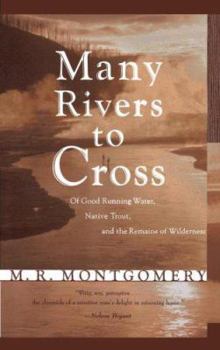Many Rivers to Cross: Of Good Running Water, Native Trout, and the Remains of Wilderness
Select Format
Select Condition 
Book Overview
Thoughtful, witty, and beautifully written, Many Rivers to Cross details M.R. Montgomery's journey into the physical and emotional territory of the American West as he explores the meaning and experience of wilderness.
Montgomery's travels take him from the headwaters of the Columbia River to eastern Oregon and to Big Goose Creek, where General Custer's reinforcements camped and went fishing instead of joining the battle at Little Bighorn...
Format:Paperback
Language:English
ISBN:0684818299
ISBN13:9780684818290
Release Date:March 1996
Publisher:Touchstone Books
Length:256 Pages
Weight:0.55 lbs.
Dimensions:0.7" x 8.4" x 5.8"
Customer Reviews
5 ratings
Dry Wit And Dry Flies
Published by Thriftbooks.com User , 18 years ago
M. R. Montgomery goes fishing. Well, to be precise the author goes in search of rare, hard-to-find, native trout. The places and the numbers of native fish he finds are as telling as the sharp observations he gives the reader. I initially picked up the book on account of it's subject matter - fly fishing for native trout around the West. As I read the last couple of chapters I found myself less interested in his fishing activity and more drawn into his commentary and writing style. To do his writing justice, here's a small taste: "... The only barriers to exotic fish in the West have always been Keep Out signs and geological obstacles like water-falls that prevented upstream invasion." "... Anyone who thinks elk and mule deer are as destructive as cows ought to take a tour of the Trinchera (Steve Forbes ranch property). I believe we counted upward of thirty mule deer and a dozen elk in a three-mile drive. And the edges of Placer Creek were solid willows; the dry hay in the meadows was knee high." "The federal government essentially owns southeastern Oregon. Private ranches, always concentrated at the few places with reliable water, have fallen one by one into the hands of the feds -- the only people in the high desert who always have cash in the bank." "... At this writing, the Alvord cutthroat is presumably extinct, having had the misfortune to encounter the gregarious and prolific stocked rainbow trout in all its waters except, of course, those waters from which cows had already evicted it." I selected these passages based on the crisp, dry wit of the author as much as the message he communicates. Anyone who reads the quarterly conservation newsletters - with the word "Trout" somewhere in the title - is familiar with the points he makes throughout the book. Planting non native trout and herding cattle in and around streams spells trouble for the locals. The locals in this particular case being Alvord cutthroat and Rio Grande cutt's to name a few. As someone who reads those quarterly newsletters, it's not always apparent why a barrier needs to be built across some stream, or why money needs to be raised to purchase private range along critical stream habitat. When you read through Many Rivers to Cross, the need to conserve and protect native fisheries comes into sharp focus. And that focus comes directly through the author's clear vision -- with a fly-rod in tow. This book was first reviewed on the reviewer's own site: EcoAngler.com - The Nature of Fly Fishing.
How The West Was Lost...
Published by Thriftbooks.com User , 19 years ago
This is one of the most beautiful books ever written about the American West, and its native fish. The book reads like a spring creek meander and includes all kinds of interesting historical facts about cowboys and indians, and western streams. You will apprechiate cutthroat trout like never before if you read this book. It was clearly a labor of love in writing...
This is a marvelous book that deserves a wider audience.
Published by Thriftbooks.com User , 25 years ago
The valuable insights, gentle humor and wistful beauties it contains should not be reserved just for the fishing fraternity. M R Montgomery describes, with wit and sensitivity, his search for the last remaining bastions of the native trout of the mountain west, the cutthroat. He describes the people who help him on his quest with humor and with empathy. In those remote places, his interest and his eyes wander to show us paticularities of landscape and peculiarities of the flora and fauna that cohabit there with the trout. Beneath the surface Montgomery is addressing concepts like "wilderness", "preservation" and "stewardship" without referring to them directly. He begins his story near the Little Big Horn Battlefield, but the last stand that he wants us to contemplate is not Custer's.
A rare find
Published by Thriftbooks.com User , 25 years ago
Montgomery's gentle quest for the last haunts of native cutthroats is worth reading twice. A more gifted writer than most of his more celebrated contemporaries.
A literate oasis in the field of angling books
Published by Thriftbooks.com User , 26 years ago
The late American author, William Humphrey (a fine writer and fly fisherman), noted that there were two types of people that wrote about fishing-fishermen that wrote and writers that fish. He recommended reading the latter. M.R. Montgomery of The Boston Globe fits into the latter class. This elegant book takes the reader into the vanishing world of the cutthroat trout in the western United States.





